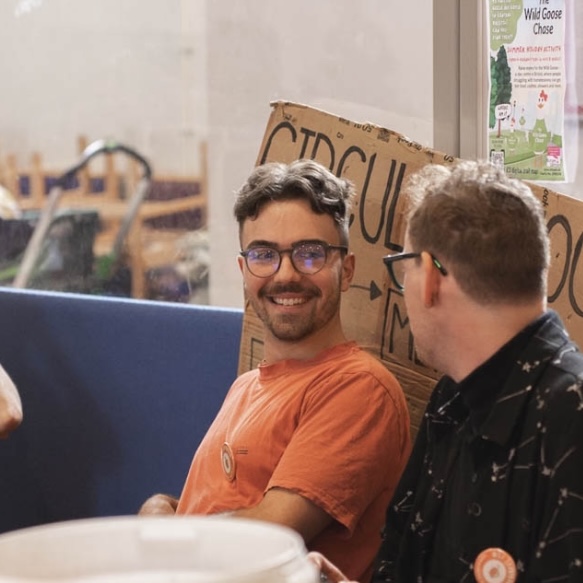Our First In-Vessel Composter: A New Chapter for Community Composting in Bristol
- Alex Montgomery
- Dec 19, 2024
- 4 min read
Updated: Dec 26, 2025
We’re excited to share a major milestone for Generation Soil CIC: the arrival of our very first in-vessel composting unit.
This marks a significant step forward in our mission to create circular food systems and regenerate urban soil health in Bristol. With this new infrastructure in place, we can compost food waste more efficiently, more locally, and at a higher quality, transforming unavoidable food scraps into living compost that feeds soil, not landfill.
This isn’t just a new piece of equipment. It’s a shift in what’s possible for community composting in Bristol.

This is a significant step towards a circular food system that regenerates urban soil health and increases local food production. In this post, we'll share the exciting details of what this means for our operations and the broader community.
What Is In-Vessel Composting?
In-vessel composting is a controlled, enclosed method of composting organic waste. Unlike open compost heaps or windrows, food waste is processed inside a sealed unit where temperature, airflow, and moisture are carefully regulated.
This allows organic material, such as food waste and wood shavings, to break down rapidly in an oxygen-rich environment, creating compost far more quickly and consistently than traditional methods.
At Generation Soil, in-vessel composting forms the central stage of our three-stage composting system, which also includes fermentation and maturation. You can explore the full system in What Generation Soil Does: Turning Food Waste into Living Soil.
Why In-Vessel Composting Matters
Organic waste makes up a significant proportion of what we throw away. When food waste ends up in landfill or anaerobic digestion, it releases greenhouse gases and loses much of its biological value.
By composting food waste through an in-vessel system, we can:
Divert food waste from landfill
Reduce methane emissions
Retain nutrients and organic matter
Create biologically active compost for growing food
This directly supports the principles explored in The Food Waste Hierarchy: Turning Waste into Soil and Community, where composting sits above disposal and below prevention and redistribution.
Most importantly, this system allows us to produce compost designed for soil regeneration, not just waste disposal.

The Benefits of In-Vessel Composting
Speed and Efficiency
In-vessel composting dramatically accelerates the composting process. What might take many months in open systems can be achieved in a matter of weeks, allowing us to process food waste continuously and at scale.
Reduced Odours and Pests
Because the system is enclosed, odours are contained and pests are kept out. This makes it ideal for urban and community composting settings, where space and neighbours matter.
High-Quality Living Compost
By carefully controlling conditions, we produce a more consistent, nutrient-rich compost. This compost supports microbial life, soil structure, and long-term fertility, aligning with the principles outlined in Soil: The Unsung Hero Beneath Our Feet.
Supporting Local Food Production
The finished compost feeds back into Bristol’s growing spaces, from gardens and allotments to food forests and community projects, including the Bristol Living Compost Project.
How This Changes Our Composting Operations
The introduction of our first in-vessel composter significantly strengthens our ability to operate at a local, regenerative scale.
Hyper-Local Processing
By composting food waste within the city, we reduce the need for long-distance transport and centralised processing. This supports our Food Waste Collection Service, keeping nutrients circulating locally rather than leaving Bristol.
Improved Data and Impact Reporting
The system allows us to track inputs and outputs more accurately, strengthening our ability to report on waste diversion, soil regeneration, and climate impact, particularly for businesses and organisations.
Education and Community Engagement
This infrastructure also opens up new opportunities for learning. The in-vessel composter becomes a practical teaching tool within our composting and circular food workshops, helping people see what happens after their food waste is collected.
Bokashi and In-Vessel Composting: Working Together
Our in-vessel system works hand in hand with Bokashi fermentation, which stabilises food waste before composting and supports microbial diversity.
If you’re curious about how microbes transform food waste before it reaches the composter, explore What Is Bokashi? How Microbes Transform Food Waste into Soil.
Together, these stages allow us to compost a wider range of food waste while maintaining high biological quality.
What’s Next for Community Composting in Bristol?
This first in-vessel unit is just the beginning.
Over the coming months, we’ll be:
Optimising and fine-tuning the system
Increasing the volume of food waste we can process
Expanding access to living compost for members
Exploring future units to scale decentralised composting
Our long-term vision is a network of local community composting infrastructure that supports food growing, soil regeneration, and community resilience across Bristol.

Join the Journey
This milestone wouldn’t be possible without the support of our members, volunteers, and partners.
If you’re based in Bristol and want to:
Have your food waste composted regeneratively
Receive or donate living compost
Support local soil regeneration
You can get involved through the Bristol Living Compost Project.
Community composting works best when it’s shared. This new chapter brings us closer to a future where food waste feeds soil, soil feeds food, and cities close the loop.




Comments